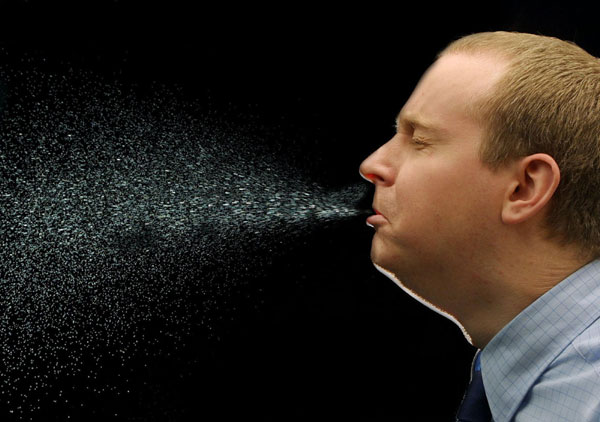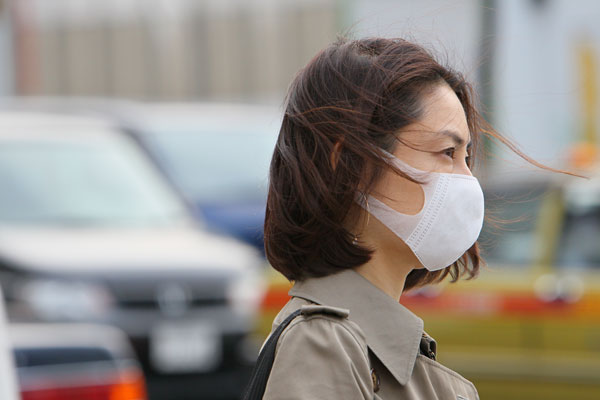While most people celebrate the warm weather and green shoots of spring, the season can be decidedly less joyful for sufferers of hay fever. Liu Zhihua reports.
Spring is a wonderful time of year for most people. It is a chance to enjoy beautiful flowers and warm air. But for those who suffer from hay fever, like Beijing resident Song Wei, it can be a challenging season. With the pollen from poplar and willow trees blowing through the Beijing air, the 63-year-old has to stay indoors as much as possible.
When flowers have only just started to bloom, he must wear a mask everywhere he goes.
"Otherwise I will sneeze, and have a stuffy nose, watery eyes and headaches," Song says.
Hay fever, also known as allergic rhinitis, happens when the lining of the nose becomes inflamed in response to breathing in certain substances, known as allergens.
Its common symptoms include sneezing, a blocked, runny or itchy nose, and itchy or watery eyes. Sometimes, sufferers will have itchy throat, poor ability to smell and headaches.
In China, the prevalence of the condition is 8 to 24 percent, although statistics vary in different regions.
Statistics show increasing numbers of people are suffering from the ailment, according to Zhu Li, deputy director with the otolaryngology, head and neck surgery department with Peking University Third Hospital.

But about 70 percent of hay fever sufferers fail to get a correct diagnosis, because it is easy to confuse the symptoms for other ailments, such as the common cold, according to Zhang Shunan, director with the lung disease department with China-Japan Friendship Hospital.
Song has no idea when he developed hay fever.
He used to catch a cold during seasonal changes, or what he thought was a cold when he had a stuffy and itchy nose. In most cases, he would buy medication over the counter. For further information of Chinese medicine, please click to learn Regulating the diet">Regulating the diet in TCM
.
He eventually went to a hospital this spring, when his stuffy nose and headaches lasted more than a month.
To his surprise, the diagnosis was hay fever.
He now takes anti-allergic medication and wears a mask wherever he goes, and feels much better.
"Hay fever is a common condition, but its symptoms are very disruptive to patients' daily lives," Zhu says.
"Moreover, it is not curable. Once people get it, it's often a lifelong condition. Only few patients, mostly kids, will recover."
The condition is related to genes and disordered immunity, but the mechanism of hay fever is not clear. Therefore, avoiding allergens and symptomatic treatment - treatment that only affects a disease's symptoms, not its cause - are very important to protect patients from suffering, Zhu adds.
Although substances that cause allergic rhinitis vary from person to person, pollen, dust mites, animal dander and indoor mold are the most common triggers.
Allergy specialists are very busy in spring and autumn, because the symptoms peak during these months, when pollen and plant seed levels are at their highest.
For most people, medication and desensitization therapy are the best ways to control the disease's development, if not to cure it. Taking no treatment at all can be risky, experts warn.
"Many people think hay fever is not a big deal, and will fade away as spring or autumn are gone," says Zhang. "But this is very wrong."
Seasonal hay fever can evolve into perennial rhinitis that can affect people throughout the year.
Among all the allergy-related conditions, hay fever is one of the most persistent and harmful - it can increase the risk of many other diseases, such as asthma and glue ear, a condition in which the middle ear fills with fluid, Zhang adds.
Severe asthma is life-threatening, and glue ear can cause permanent hearing loss.
Many patients don't believe they've got hay fever when they are diagnosed. Quite a few treat themselves as if they have a cold, and drugs for colds are very harmful to such patients, according to Zhu.

When hay fever affects children, the situation will be even trickier.
Children with hay fever often have increased incidence of asthma, glue ear, sinusitis, malignant snoring and adenoid hyperplasia (the over-enlargement of the lymph glands located above the back of the mouth), which are bad for their body development and overall health.
But many patients don't follow doctors' orders and often skip medications, which makes treatment less effective, Zhu says.
Zhang says he has met lots of patients who suffered from wrong treatments.
One of the patients is a woman in her 30s. Over the past five years, she often caught a "cold", which occurred suddenly and made her nose stuffy. For further information of Chinese medicine, please click to learn Living a normal daily life in TCM.
Busy with work, she didn't go to a doctor until last year. She was diagnosed with having a cold and took medication for about two months until doctors found she actually had hay fever.
Her condition had become so severe that the inflammation had made her nose stinky.
Now the woman has become much better after taking traditional Chinese medicines, Zhang says.
Zhang claims TCM is good at treating hay fever, because it improves patients' general health and balances their disordered immunity.
However, it is always better to prevent an illness than to seek relief after it strikes.
Keeping a healthy lifestyle, maintaining good immunity and avoiding trigger factors, such as pollution, fatigue and the cold, are the keys to prevent allergic rhinitis, experts say.
Zhu also recommends that the government report the pollen concentration level to the public, so that people with allergies can be better informed. For further information of Chinese medicine, please click to learn Balance between work and rest in TCM.
Abstracted from chinadaily.com.cn.

![Diseases, Symptoms, tcm, [tcmwindow.com]](/uploadFile/adImg/2015/11/11/f5cbfcc0-4df5-4646-9b9a-f316651a0199.jpg)





